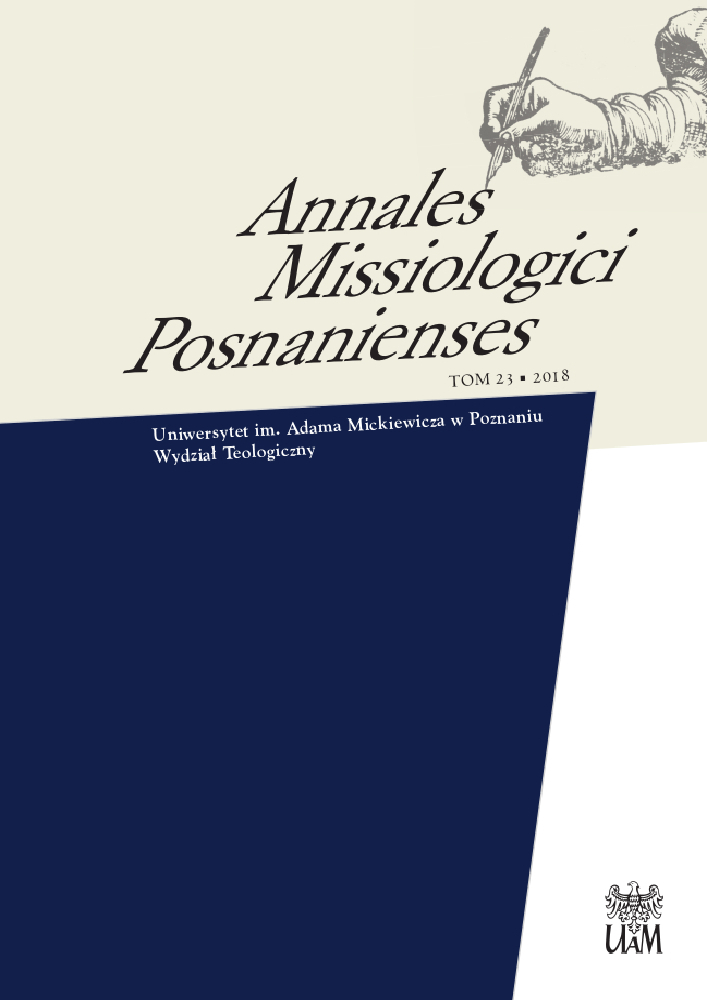Abstract
The turn of the 20 th and 21 st centuries is connected with the significant development of the technology of social media. This is the period when the so-called new media that have a significant impact on building religious awareness of modern societies. This article is a record of research on the meanings of the concept of mission in new media, as well as the extent to which these meanings have changed over time, from ancient periods to the present day. The author presents changes in the scope of the meaning of the term missions and shows his contemporary meanings that are present in new media: entertainment, political, business, cosmic, vocational, diplomatic, automotive, health or sports. The concept of missions in the Christian field occurs in around 13%. The author makes a statement of this fact, to what extent it is the result of the secularization of society, and how much of a positive process of implementing the concept of missions into a broader linguistic range of meaning, or both.
References
Arzubialde, Santiago. Corella, Jesús. Garcia-Lomas, Juan Manuel. Constituciones de la Compañia de Jesus. Introducción y notas para su lectura. Bilbao: Mensajero–Sal Terre, 1997.
Barth, Karl. „La théologie et la mission à l’heure présente.” Cahiers du monde non chrétien (1932) 4 : 70-104.
Benedykt XVI. Orędzie na 43. Światowy Dzień Środków Społecznego Przekazu. Nowe technologie, nowe relacje. Trzeba rozpowszechniać kulturę szacunku, dialogu i przyjaźni z 24 stycznia 2009. Dostęp 15 września 2018. http://www.vatican.va
Biblia Tysiąclecia. Pismo Święte Starego i Nowego Testamentu. Poznań: Pallottinum, 2003.
Bria, Ion. Chanson, Philippe. Gadille, Jacques. Spindler, Marc. Misjologia. Kontekst ekumeniczny. Tłum. Agnieszka Kuryś. Warszawa: Verbinum, 2007.
Franciszek, Komunikacja i Miłosierdzie – owocne spotkanie. Orędzie na 50. Światowy Dzień Środków Społecznego Przekazu z 24 stycznia 2016. Dostęp 15 września 2018. http://www.vatican.va
Franciszek. Prawda was wyzwoli (J 8, 32). Orędzie na 52. Światowy Dzień Środków Społecznego Przekazu Fake news a dziennikarstwo pokoju z 24 stycznia 2018. Dostęp 15 września 2018. http://www.vatican.va
Grzegorczykowa, Renata. Wstęp do językoznawstwa. Warszawa: PWN, 2008.
Jabłoński, Franciszek. Konspekty do wykładów z misjologii. Górna Grupa: Verbinum, 2017.
Jan Paweł II. Orędzie na 24. Światowy Dzień Środków Społecznego Przekazu Misja Kościoła w erze komputerów z 24 stycznia 1990. Dostęp 15 września 2018. http://www.vatican.va
Jenkins, Henry. Kultura konwergencji. Zderzenie starych i nowych mediów. Tłum. Małgorzata Bernatowicz i Mirosław Filiciak. Warszawa: Wydawnictwa Akademickie i Profesjonalne, 2007.
Kloch, Józef. Kościół w Polsce wobec Web 2.0. Kielce: Jedność, 2013.
Levinson, Paul. Miękkie ostrze. Naturalna historia i przyszłość rewolucji informacyjnej. Tłum. Hanna Jankowska. Warszawa: Muza, 2016.
Levinson, Paul. Telefon komórkowy. Jak zmienił świat najbardziej mobilny ze środków komunikacji. Tłum. Hanna Jankowska. Warszawa: Muza, 2006.
Magnus, Gregorius. Moralia in Iob, XXXV, 16 (Corpus Christianorum. Saeries Latina 143B). Turnhout. Brepols Bublishers. 1985.
Megapanel PBI/Gemius. styczeń 2018. Dostęp 15 września 2018. http://www.pbi.org.pl
Müller, Karol. „Misjologia: wprowadzenie.” Kościół misyjny. Podstawowe studium misjologii. Red. Sebastian Karotempler. Warszawa: Missio-Polonia, 1997.
Newspoint. Dostęp 15 września 2018. https://www.newspoint.pl
Nowa encyklopedia powszechna PWN. T. 4. Warszawa: Wydawnictwo Naukowe PWN, 1998.
Różański, Jarosław. Misje, a promocja ludzka. Warszawa: Missio-Polonia, 2001.
Sondel, Janusz. Słownik łacińsko-polski dla prawników i historyków (wydanie na CD). Kraków: TAiWPN Universitas, 2006.
Seunois, André. Introduction à la missiologie, Beckenried: Schöneck, 1952.
Słownik wiedzy o mediach. Red. Edward Chudziński. Warszawa–Bielsko-Biała: Park, 2007.
Sobór Watykański II. „Dekret o działalności misyjnej Kościoła.” Sobór Watykański II. Konstytucje, dekrety, deklaracje. Tekst polski. Nowe tłumaczenie. Poznań: Pallottinum, 2002. 433-471.
Sobór Watykański II. „Konstytucja dogmatyczna o Kościele.” Sobór Watykański II. Konstytucje, dekrety, deklaracje. Tekst polski. Nowe tłumaczenie. Poznań: Pallottinum, 2002. 5-75.
License
Copyright (c) 2019 Marcin Wrzos

This work is licensed under a Creative Commons Attribution-NoDerivatives 4.0 International License.
PUBLISHED WORK ARE LICENSED UNDER A CREATIVE COMMONS:
Before 2006 all published texts are copyrighted.
Authors
Authors of texts accepted for publication in the journal Annales Missiologici Posnanienses are required to complete, sign and return to the editorial address an agreement to grant free license to works, with an obligation to grant CC sublicense.
According to the agreement, the authors of the texts published in the journal Annales Missiologici Posnanienses grant to Adam Mickiewicz University in Poznan a non-exclusive and royalty-free licencji Creative Commons Attribution-NonCommercial-NoDerivatives 4.0 International (CC BY-NC-ND 4.0) license and allow sublicensing under the same conditions.
The authors retain the rights to further freely dispose of the work.
Users
Interested internet users are entitled to use works published from 2021 onwards in Annales Missiologici Posnanienses under the following conditions:
- Attribution - the obligation to provide with the distributed work, information, about the authorship, title, source (links to the original work, DOI) and the license itself;
- Non-commercial use - you should not use the work for commercial purposes;
- Without creating derivative works - the work must be preserved in its original form, e.g. translations, adaptations may not be distributed without the author's permission.
Interested Internet users are entitled to use works published between 2006 and 2020 in Annales Missiologici Posnanienses under the following conditions:
- acknowledgment of authorship - the obligation to provide with the distributed work, information, about the authorship, title, source (links to the original work, DOI) and the license itself;
- without creating derivative works - the work must be preserved in its original form, e.g. translations, adaptations cannot be distributed without the author's consent.
Other
Adam Mickiewicz University of Poznan retains the right to the journal as a whole (layout, graphic form, title, cover design, logo, etc.).


